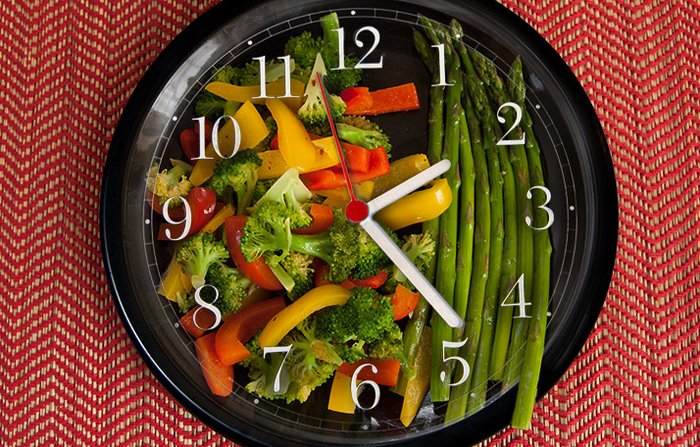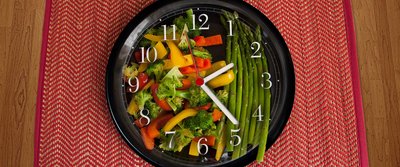One of the most widely debated topics in the bodybuilding and fitness world is the optimal number of meals to eat per day for building muscle, losing fat, and increasing strength. Many individuals eat every 2-3 hours. Some eat only once per day or within a small window of time. Others do something in between.
Is there an ideal meal frequency to optimize fat loss, muscle growth, and metabolism? Let's take a look at the common claims people make about meal frequency and the research behind those claims, with an eye toward figuring out how often you should really eat to most effectively achieve your goals!
Meal Myth 1: Eating More Frequently Will Increase My Metabolism
Individuals who eat multiple meals throughout the day often cite an increase in metabolic rate as the reason for doing so. However, can increasing the number of times you eat each day really speed up your metabolic rate and help with weight loss?

When consuming the same total calories split between two versus six meals, one versus three versus five meals, or two versus 3-5 meals, there was no difference in metabolic rate in overweight or obese individuals.
Several studies have investigated this question, and the results are fairly conclusive. When consuming the same total calories split between two versus six meals, one versus three versus five meals, or two versus 3-5 meals, there was no difference in metabolic rate in overweight or obese individuals.[1-2] Furthermore, no difference in metabolic rate was seen between consuming 2 or 7 meals daily in participants of a healthy weight.[4]
The truth
Increasing meal frequency does not increase metabolic rate when dietary intake is matched. In other words, total calories consumed count more than frequency! Consume a number of meals that allows you to meet your nutritional needs consistently each day, and don't stress over needing to eat every 2-3 hours.
Meal Myth 2: Eating 5-6 Smaller Meals a Day Will Aid Weight Loss
You may have been told before that eating 5-6 mini meals a day will help you achieve your fat-loss goals faster. This sounds great in theory—eat more frequently, and still lose weight! However, findings from studies looking at this topic aren't so positive.
The majority of the studies investigating the effects of meal frequency on weight loss have been performed in overweight and obese populations. When daily calorie intake was matched, no difference in weight loss between one versus nine meals, three versus six meals, one versus three versus five meals, two versus 3-5 meals, or three versus six meals has been observed.[2,3,5-7]

For individuals with a healthy body weight, no difference in weight change was observed when consuming one versus three and two versus nine meals per day.
For individuals with a healthy body weight, no difference in weight change was observed when consuming one versus three and two versus nine meals per day. Furthermore, no difference in weight loss between one versus five meals was observed in dieting participants of healthy bodyweight.[8-10]
The truth
Meal frequency doesn't appear to have an effect on weight maintenance or weight loss when calorie intake is matched. Focus on consuming fewer calories than you are expending for weight loss, rather than the number of meals you are consuming.
Meal Myth 3: More Meals Means More Muscle Growth
Many individuals consume more meals throughout the day in an attempt to build more muscle. Based on studies looking at the rate of muscle protein synthesis—the rate at which protein is being made in the muscle, which means more muscle growth—following feeding, several researchers have suggested that a meal frequency of 3-5 meals daily, with protein intake evenly distributed, is optimal to maximally stimulate muscle protein synthesis rates and therefore muscle growth.[11,12]
However, these studies have all been acute, meaning they gave subjects one protein-filled meal, tracked rates of protein synthesis for a few hours, and then called it a day. (OK, it's not quite that simple, but you get the general point.) What we really need to look at is more long-term data to see if, over time, the number of meals you eat a day has a significant impact on muscle growth.
Looking at studies lasting anywhere from 2-8 weeks, for both overweight individuals and individuals with a healthy BMI, it doesn't appear that the number of meals consumed per day has a significant impact on lean mass.[7,8,13-15] Even for individuals who are dieting, eating six meals a day doesn't appear to be more beneficial than eating three meals when it comes to maintaining muscle mass.

Looking at studies lasting anywhere from 2-8 weeks, for both overweight individuals and individuals with a healthy BMI, it doesn't appear that the number of meals consumed per day has a significant impact on lean mass.
Based on these studies, it doesn't appear that meal frequency has an effect on muscle mass. However, it should be noted that the previously mentioned studies were not done in athletes who regularly lift weights.
To date, only one study has investigated the effects of meal frequency and muscle mass in physically active individuals. Researchers out of Nagoya University (Japan) recruited male boxers and had them consume 1,200 calories a day while dieting for a fight. Half of the participants consumed six meals a day, while the other half consumed two meals a day. After two weeks, there was greater muscle retention with six meals a day.[16]
It should be noted here that calorie intake was only 1,200 calories a day and protein intake was only 60 grams a day (roughly 0.45 grams per pound of body weight), both of which are far lower than most males who are dieting with the goal of muscle retention. Therefore, these results need to be interpreted with caution, and further research is needed on meal frequency in athletes.
The truth
Meal frequency doesn't seem to have a significant effect on muscle mass when dietary intake is constant; however, more research is needed in athletes who are lifting weights. Focus on consuming adequate calorie and protein intake (around 30 grams of protein per meal) while increasing strength in the gym to maximize muscle growth.
A Final Word on Frequency
Based on the current research, meal frequency doesn't seem to be as important as once thought for speeding up metabolic rate, aiding fat loss, or increasing muscle growth. This is supported in practice by individuals consuming a range of meal frequencies from one to more than eight meals a day who have been able to develop great physiques and achieve their fitness goals.
In other words, there is no one best meal frequency. Total calories and macronutrient composition seem to play a greater role in fat loss and muscle growth. Find a meal frequency that allows you to be consistent with your nutrition plan, and you will be well on your way to reaching your fitness goals!
References
- Taylor, M. A., & Garrow, J. S. (2001). Compared with nibbling, neither gorging nor a morning fast affect short-term energy balance in obese patients in a chamber calorimeter. International Journal of Obesity and Related Metabolic Disorders: Journal of the International Association for the Study of Obesity,25(4), 519-528.
- Garrow, J. S., Durrant, M., Blaza, S., Wilkins, D., Royston, P., & Sunkin, S. (1981). The effect of meal frequency and protein concentration on the composition of the weight lost by obese subjects. British Journal of Nutrition,45(01), 5-15.
- Verboeket-Van De Venne, W. P., & Westerterp, K. R. (1993). Frequency of feeding, weight reduction and energy metabolism. International Journal of Obesity and Related Metabolic Disorders: Journal of the International Association for the Study of Obesity, 17(1), 31-36.
- Verboeket-Van De Venne, W. P., Westerterp, K. R., & Kester, A. D. (1993). Effect of the pattern of food intake on human energy metabolism. British Journal of Nutrition, 70(01), 103-115.
- Bortz, W. M., Wroldsen, A., Issekutz Jr, B., & Rodahl, K. (1966). Weight loss and frequency of feeding. New England Journal of Medicine, 274(7), 376-379.
- Finkelstein, B., & Fryer, B. A. (1971). Meal frequency and weight reduction of young women. The American Journal of Clinical Nutrition, 24(4), 465-468.
- Cameron, J. D., Cyr, M. J., & Doucet, E. (2010). Increased meal frequency does not promote greater weight loss in subjects who were prescribed an 8-week equi-energetic energy-restricted diet. British Journal of Nutrition, 103(08), 1098-1101.
- Stote, K. S., Baer, D. J., Spears, K., Paul, D. R., Harris, G. K., Rumpler, W. V., ... & Mattson, M. P. (2007). A controlled trial of reduced meal frequency without caloric restriction in healthy, normal-weight, middle-aged adults. The American Journal of Clinical Nutrition, 85(4), 981-988.
- Swindells, Y. E., Holmes, S. A., & Robinson, M. F. (1968). The metabolic response of young women to changes in the frequency of meals. British Journal of Nutrition, 22(04), 667-680.
- Wolfram, G., Kirchgessner, M., Müller, H. L., & Hollomey, S. (1986). Thermogenesis in humans after varying meal time frequency. Annals of Nutrition & Metabolism, 31(2), 88-97.
- Phillips, S. M., & Van Loon, L. J. (2011). Dietary protein for athletes: from requirements to optimum adaptation. Journal of Sports Sciences, 29(sup1), S29-S38.
- Norton, L., & Wilson, G. J. (2009). Optimal protein intake to maximize muscle protein synthesis. AgroFood Industry Hi-Tech, 20, 54-57.
- Soeters, M. R., Lammers, N. M., Dubbelhuis, P. F., Ackermans, M., Jonkers-Schuitema, C. F., Fliers, E., ... & Serlie, M. J. (2009). Intermittent fasting does not affect whole-body glucose, lipid, or protein metabolism. The American Journal of Clinical Nutrition, 90(5), 1244-1251.
- Arnal, M. A., Mosoni, L., Boirie, Y., Houlier, M. L., Morin, L., Verdier, E., ... & Mirand, P. P. (2000). Protein feeding pattern does not affect protein retention in young women. The Journal of Nutrition, 130(7), 1700-1704.
- Arnal, M. A., Mosoni, L., Boirie, Y., Houlier, M. L., Morin, L., Verdier, E., ... & Mirand, P. P. (1999). Protein pulse feeding improves protein retention in elderly women. The American Journal of Clinical Nutrition, 69(6), 1202-1208.
- Iwao, S., Mori, K., & Sato, Y. (1996). Effects of meal frequency on body composition during weight control in boxers. Scandinavian Journal of Medicine & Science in Sports, 6(5), 265-272.

